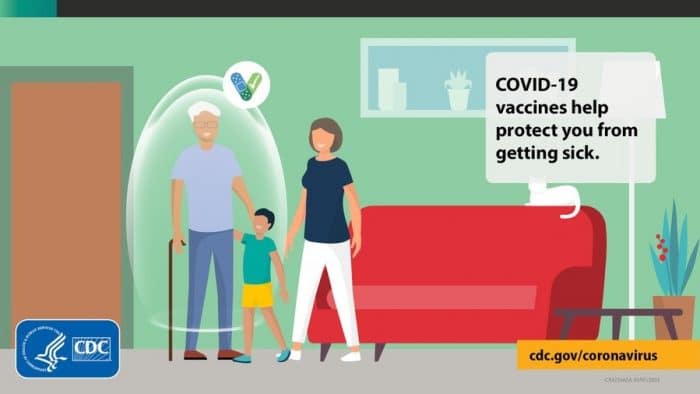By Cindy Weinberger MS, RD, CDN
When it comes to COVID-19, everyone is eager to find a cure, a vaccine, or even a quick fix. Months have passed, and although vaccines are making progress, it is becoming more and more clear that it will take much longer for “life to go back to normal.” Masks are required in all stores and indoor gatherings. Public restrooms are closed. Fitting rooms are closed. Shopping with a mask is not enjoyable. Oh, how we miss the days before the coronavirus pandemic!
On the bright side, there are many recent studies that suggest that vitamin D can help prevent infection from the coronavirus and/or lessen the severity of symptoms. Vitamin D is a fat-soluble vitamin with many various functions in our body – one being immune health. Therefore, it makes sense that vitamin D would be helpful and essential in combatting the coronavirus.
A study by the Azrieli Faculty of Medicine of Bar-Ilan University and Leumit Health Services states that low levels of Vitamin D put people at a higher risk for contracting the coronavirus.
“The main finding of our study was the significant association of low plasma vitamin D level with the likelihood of COVID-19 infection among patients who were tested for COVID-19, even after adjustment for age, gender, socio-economic status and chronic, mental and physical disorders,” said Dr. Eugene Merzon, head of the Department of Managed Care and leading researcher of the LHS group. “Furthermore, low vitamin D level was associated with the risk of hospitalization due to COVID-19 infection, although this association wasn’t significant after adjustment for other confounders.”
Vitamin D is a vitamin that is essential in boosting our immune system.
“We don’t know the mechanism,” Frenkel-Morgenstern said. “What we do know is that people who develop severe COVID and were hospitalized – these people have significantly low vitamin D levels.”
Vitamin D is super easy to get these days. Unlike all other vitamins, vitamin D is not only found in food. Vitamin D gets absorbed into our skin from the sunlight. Even if you are still strictly social distancing, there is no harm in heading outside to soak up some sun and increase your vitamin D levels.
How does sunlight help increase our vitamin D levels? Vitamin D is synthesized in the skin from UV radiation through a process called photolysis. Vitamin D then travels to the kidney where it gets converted into its active form and can perform its various functions. Vitamin D has many different functions that have a major impact on the body. The common functions of vitamin D include bone formation and resorption, regulating calcium homeostasis, and, of course as mentioned, immune function.
Vitamin D really is so important for our bodies, and so easy to obtain, however, a large portion of the population is deficient in Vitamin D (especially during the winter months when sunlight exposure is at a minimum). 600 IU (International Units) a day of vitamin D is recommended up to age 70. It is recommended for men and women over age 70 to increase their uptake to 800 IU daily. Vitamin D is the only vitamin that all pediatricians recommend for babies to take supplements daily.
One can get Vitamin D from the sun, diet, or supplements. One cannot simply rely on sunlight for adequate levels of vitamin D and should therefore make sure to take it in through one’s diet, too. Sufficient intake can be obtained from vitamin D-rich foods such as egg yolks, saltwater fish, liver, cheese, and fortified foods such as milk, breakfast cereals, soy milk, rice milk, yogurt, orange, and margarine.
When one cannot get adequate amounts of Vitamin D from diet or sunlight, supplements are recommended, due to the consequences of deficiency. Vitamin D supplements can be taken as capsules, gummies, liquid, or chewable tablets. It is important to take Vitamin D supplements in the optimal conditions in order to promote utmost absorption. Several studies examined the influence of different meal conditions on absorption of Vitamin D supplements. Studies have shown that taking Vitamin D supplements with a meal containing fat significantly improved absorption, compared to a meal without fat. Since Vitamin D is a fat-soluble vitamin, the fat component in the meal enhances absorption, and therefore Vitamin D is best absorbed by the body when supplements are taken with a meal containing a fat component.
Dr. Suozzi, a Yale Medicine dermatologic surgeon, says she worries that news coverage about the studies will cause people to sunbathe too much or take dangerous levels of vitamin D supplements. While too little vitamin D can cause a deficiency causing bone disorders, too much vitamin D can cause toxicity leading to heart and kidney problems. Plus, trying to get too much vitamin D from the sun puts people at a higher risk for skin cancer.
“Healthy people can get adequate vitamin D from their diets and from reasonable amounts of intermittent sun exposure, like going for a walk outdoors. It is not necessary to sunbathe to get adequate levels of vitamin D,” Dr. Suozzi says.
Vitamin D levels can easily be assessed by a blood test. Check with your physician to make sure that you have adequate levels of vitamin D. If your levels are low, discuss what the best option would be. Some might require additional time in the sun, and/or an increased food intake of vitamin D foods, while others might require supplementation.
Let’s hope that with the right amount of vitamin D, a healthy immune system, and, of course, Divine supervision, this horrific pandemic will vanish as quickly as it came.
Cindy Weinberger MS, RD, CDN, is a Master’s level Registered Dietitian and Certified Dietitian-Nutritionist. She graduated CUNY Brooklyn College receiving a Bachelor’s in Science and Master’s degree in Nutrition and Food Sciences. She is currently a private nutrition consultant and conducts nutrition workshops. She can be reached at CindyWeinberger1@gmail.com or 917-623-6237.
Categorised in: Health & Fitness














